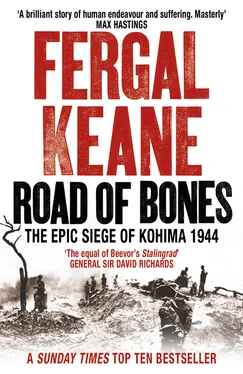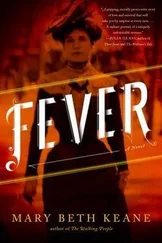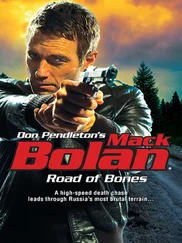Another foreigner to arouse suspicion was a Mr G. R. Powell of the Watchtower Society of Australia. This representative of the Jehovah’s Witnesses was placed under surveillance by the Burma police in a classic case of mistaken priorities. Mr Powell represented a religious faith that customarily excited the suspicion of colonial officials, yet the Jehovah’s Witnesses were among the groups enthusiastically persecuted by Hitler’s Reich and would have offered little threat to the security of Burma. *
The captain made detailed notes on roads and beaches that would make suitable invasion points. But for all the impressive detail on local military dispositions and possible enemy spies, Pardoe’s report did not contain a single line about possible evacuation routes for a retreating army or for tens of thousands of refugees. In those becalmed days before Japan entered the war, he could hardly have foreseen such a necessity. At the end of the report an unnamed intelligence officer wrote, ‘A very good report – may be very useful if fighting breaks out in Burma’. If – the conditional that masked a vast failure of intelligence, planning and, perhaps above all, imagination. The defence of Burma was left to a small garrison consisting of two British battalions and the eight battalions of local troops and military police that comprised the Burma Rifles and the Burma Frontier Force, as well as the part-timers of the Burma Auxiliary Force, all dispersed throughout the country’s three military regions – upper, middle and lower Burma. It was a force useful for colonial missions of chastisement but utterly unfit for defending a country larger than France against invasion by a modern army supported by armour and aircraft.
From Churchill and the Chiefs of Staff in London to the GOC Burma, Major General D. K. McLeod, and the Governor, Sir Reginald Dorman Smith, nobody had allocated the resources needed to defend Burma against an invasion from Thailand. They simply had not visualised Japan occupying Thailand and then sweeping Britain aside. Forget the evidence of Japan’s victory over the Russians four decades before, the abundant intelligence on Tokyo’s new ships, aircraft and artillery, or the defeats inflicted on the Chinese over the past decade. The Japanese were still little yellow men, myopic and bandy-legged, and could never pose a mortal threat to the greatest empire the world had ever seen. As Corporal Fred Millem of the Burma Auxiliary Force, the local equivalent of the Territorial Army, ruefully put it after the disaster: ‘China had exhausted Japan – she could not last more than three months. Japan’s air force was no good, her pilots all had bad eyesight and could not fly by night … Etc, etc, etc, oh yeah, oh yeah, oh yeah!’ When war came, the Japanese 15th Army would deploy four divisions against one and a half divisions of British, Burmese and Indians.
The overall responsibility for the defence of Burma was given to the Commander-in-Chief Far East, Air Chief Marshal Sir Robert Brooke-Popham, who spent a year pleading in vain for more resources. Four days before Pearl Harbor, the prime minister described the threat of Japanese action as a ‘remote contingency’. Fighting alone in the years before America joined the war, he had understandably avoided confrontation with the Japanese. At one point the great enemy of appeasement was forced to kowtow in the face of Japanese insistence that he close the Burma Road, along which America shipped its war materiel north from Rangoon to the Chinese Nationalists. Shutting this lifeline would strangle the Chinese war effort and allow Japan to redeploy thousands of troops for use against America in the event of war. The closure of the road in July 1940 amounted, according to the old Burma hand George Orwell, to ‘a semi-surrender to Japan’. From July to October 1940 Churchill closed the road, until American pressure forced him to change his mind. However limited Churchill’s choices, the episode should have illustrated to the British just how much Burma mattered to the Japanese.
It is not known what ultimately happened to the report submitted by Captain Pardoe. It was certainly seen by the intelligence department in Rangoon, but whether it went higher than that we will never know. As for Pardoe, he would not survive the war. He was killed eight months later, fighting the Japanese in Hong Kong.
For Emile Charles Foucar, barrister-at-law, Saturday, 6 December 1941, was one of the most important days in the social calendar. He was not alone in waking with great excitement. That afternoon the finest ponies in Burma would race for the Governor’s Cup at the Rangoon Turf Club. It was an event that would draw virtually the entire European population and, as the only club that allowed non-white members, it would also attract Burmese and Indians of good social standing. Sadly for Foucar, he would be without his wife Mollie. She and the couple’s two children, a boy and a girl, had been shipped to England as a precautionary measure a few weeks before. Official Burma might play down the danger of invasion, but to Foucar the evacuation made good sense in view of the threatening noises coming from Japan. Emile Foucar was, above all, a man of common sense. He had been born in Burma, the son of a businessman who had come out from Britain in the late nineteenth century, a man swept eastward by the imperial dream at the very moment it was approaching its zenith. In the language of the colonial guide-books, the Burma he found was wreathed in the exotic: ‘Should Burma be visited after a tour in India, the traveller cannot fail to be struck with the great difference in the people and the scenery of the two countries. The merry, indolent, brightly-clothed Burmese have no counterpart in Hindustan, and the richness of the soil and exuberance of the vegetation will be at once remarked.’
Emile Foucar’s father and uncle began a timber business, exporting Burmese teak all over the world from their mills in the coastal city of Moulmein. Here Foucar senior did his patriotic duty by joining the Moulmein Volunteer Artillery. Like most of the white community, he sent his son Emile to England to be educated. There the young Foucar left school just in time to fight as an officer in Flanders. After the war he studied law in London but, finding the pickings slim, decided to return home and set up in practice in the country of his birth. Foucar gathered a substantial clientele from across the country’s racial mix. He could find himself representing a monk demanding the right to succeed to a monastery, investigating an insurance fraud by Chinese businessmen, or acting as counsel for a British plantation owner involved in a legal wrangle with the government.
When Emile Foucar arrived at the races on that humid December day he heard the band of 1st battalion, Gloucestershire Regiment (the 1st Glosters), playing and saw green lawns ‘ablaze with flowers and brilliant costumes’. The Governor, Sir Reginald Dorman Smith, made a grand entrance, driven down the course to the members’ enclosure, acknowledging the applause of the crowd with a gracious wave. It was, Foucar remembered, a golden afternoon.
He moved easily among the crowds, European and Asian, nodding to clients as he went. As an observer of his own society Foucar was sharp-witted and fair-minded, pushing at the limitations of his age and background. In a memoir published a decade after the war, he recalled how the Burmese were systematically excluded from British, and therefore influential, social circles, denied control over their country’s resources, and encouraged in subservience and servility. They were barred from European strongholds such as the Pegu Club and the Rangoon Gymkhana Club, where much of the real business of money and politics was conducted. On the trains European passengers like Foucar’s friend Bellows could make a scene if asked to share a carriage with a non-white. Bellows, who had been forty years in Burma, ‘insisted to the stationmaster that his fellow traveller be removed … so the merchant was put elsewhere’. Foucar also had an eye for the hypocrisies of late imperial life. It was well known, he wrote, that Bellows had a Burmese wife.
Читать дальше












